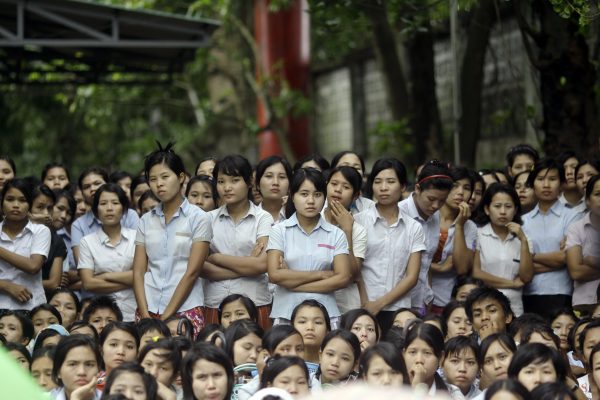Over the course of a few years, the number of garment factories nearly tripled. The Myanmar Garment Manufacturers Association estimates that the current 350,000 garment workers will have increased to 1.5 million workers by 2024.
In the recently published report ‘The Myanmar Dilemma’, the Netherlands Centre for Research on Multinational Corporations describes human rights and labour rights issues in the Myanmar garment industry. Working together with two Myanmar NGOs, Action Labor Rights and Labour Rights Defenders and Promoters, 400 workers from 12 factories and a wide range of stakeholders were interviewed.
The rush to invest in Myanmar is fraught with perils. While small steps have been taken towards societal reform, great problems remain. The rule of law is not adequately upheld. The army continues to exert power over society and aggressively fight ethnic groups in several parts of the country. Military and former military land owners profit from the development of industrial parks and factories. Villages have been evicted to make way for industrial parks and special economic zones without consultation or adequate compensation.
For more than 50 years, independent trade unions were prohibited, strikes were banned and any form of dissent was violently suppressed. Trade unionists, human rights defenders and members of the opposition were detained and served many years in prison while others fled the country and lived in exile. But as trade unions and independent NGOs have now been granted some level of freedom, a labour movement is in full development.
A huge task lies ahead. Workers are generally unaware of their rights and few garment factories are unionised. Efforts of workers to form unions are often met with repercussions. Union leaders and activists have been dismissed and blacklisted, preventing them from finding new jobs.
While the Myanmar garment industry continues to grow, workers toil on in silence. Many garment workers hail from the impoverished countryside. They often end up in slums, sometimes without electricity or running water. The legal minimum wage is a pitiful US$2.65 per day. New workers are frequently paid below this minimum as Myanmar law allows for employers to pay workers apprentice or probation wages at 50 per cent or 75 per cent during the first six months of employment.
To earn a living, they work for long hours, sometimes for up to 11 hours a day. In peak periods, workers sometimes are forced to do unpaid overtime. It often happens that salaries are withheld when workers cannot work due to illness. Girls younger than 15 years old find employment in this sector. And to make matters worse, workers have very few opportunities to file complaints and get redress.
Many of the issues described above are not infractions of Myanmar’s lagging labour law. Myanmar labour law allows for the payment of outright poverty wages, sets the minimum age for employment at 14 years and puts up barriers for workers to join and form unions and to engage in collective actions.
The Myanmar economy is shaped by ongoing armed conflict, a broad range of human rights risks, substandard labour legislation and a limited space for civil society. The newly installed government needs to update, amend and enforce legislation that is in line with international human rights standards. In the meantime, there are significant human rights risks and labour rights violations being committed in the industry that need to be addressed as a matter of urgency.
All companies operating in this environment have a responsibility that goes beyond usual corporate compliance. Both foreign-owned manufacturers and international buying companies should develop and implement rigorous and country-specific due diligence procedures looking into risks related to land grabbing, questionable ownership and military influence, the powerful presence of foreign-owned garment factories, child labour and the position of ethnic workers. A thorough risk assessment of human rights and labour rights violations is required to assess whether business can begin. Companies should consider community rights and customary land rights, and consequently consistently apply the principle of free prior and informed consent, especially in relation to existing and developing industrial areas and special economic zones. When assessing risks, companies should consult local labour unions and labour NGOs, as well as relevant international CSOs.
States hosting the mother companies of foreign-owned garment factories operating in Myanmar as well as states hosting brands, retailers, buying houses and agents that source from and trade with Myanmar should see to it that companies domiciled in their jurisdiction respect human rights throughout their supply chains. This should include enacting legislation or regulations to require international apparel buyers to periodically disclose information about their supply chains; introducing legislation that holds companies accountable for human rights violations throughout their supply chains; raising concerns on human rights and labour rights violations in bilateral contacts with the Myanmar government; and ensuring that other laws and policies governing the creation and on-going operation of business enterprises do not constrain but enable business respect for human rights.
Without such reforms, workers in Myanmar will continue to be exploited.
Martje Theuws and Pauline Overeem are Senior Researchers at the Centre for Research on Multinational Corporations (SOMO).


As the military occupies 25% of the seats in Myanmar’s legislature it effectively has veto power over any laws regarding the human rights of these workers, etc. Does its leaders have any interest in doing this? Are they so concerned about fighting the insurgents in the countryside that they do not really care about these workers’ rights? Are they receiving gifts, kickbacks, etc from the international textile companies operating in Myanmar? If so, they will have more reason to keep things as they are now.